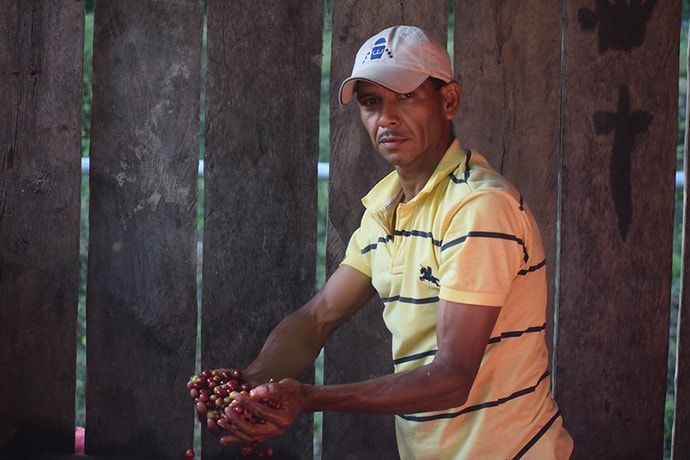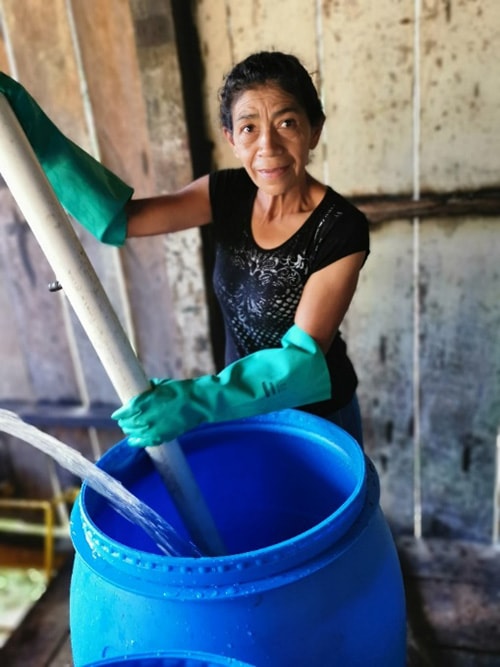By Alberto Solano, Guillermo Jiménez, and Sierra Golden

Hipólito ‘Polo’ Chavarria of San José, Nicaragua, shows off coffee beans he grew using more environmentally friendly farming practices. Photo courtesy of Agros International
Travel writer and documentarian Rick Steves calls climate change, conflict, and corruption “the three Cs of extreme poverty.” Agros has long tackled conflict and corruption as causes of poverty by giving marginalized families in rural Latin America the opportunity to own land and transform themselves from day laborers into successful agribusiness owners. In 2020 we added a climate smart agriculture program to our work as a top new initiative.
Why climate smart agriculture? Climate-smart agriculture has three objectives that make it a holistic and equitable solution for poverty in the age of climate change:
- Increased adaptability of farmers to changing climate conditions
- Mitigation or lessening of greenhouse gas emissions caused by farming
- Increasing productivity, helping farmers earn a profit
Thanks to the generosity of donors, foundations, and a special partnership with Rick Steves, families in Agros villages in Nicaragua completed their first year of this new program in the summer of 2020. Families attended trainings that taught them to adapt to our changing world, be more environmentally friendly, and earn more to support their families.
Results were impressive:
- Chemical fertilizer usage reduced by 40%
- Pesticide usage reduced by 50 – 75%
- Cost of farming reduced by 15 – 32%
- Yields increased by 18%
- Completion of a nursery with capacity to produce 50,000 plants to reforest watershed areas
The climate smart program also established a vermicompost production and training facility that has produced more than 50 tons of compost; built a water irrigation system; and installed the first hydroponic module in the Matagalpa region. As a result, families have seen the number of annual harvests increase from one to three—improving their crop yields by 18 percent and their household incomes by 15 percent.
In one training, 67 farmers were taught to prepare bio-fertilizers. Bio-fertilizers are made from products like manure and naturally occurring elements such as magnesium and ash. They are cheaper to acquire and more environmentally friendly than traditional chemical fertilizers such as urea. Urea and other nitrogen-based fertilizers generate large amounts of methane when manufactured and emit ammonia to the atmosphere when released in the soil, contributing to greenhouse gases.
Farmers who participated in the bio-fertilizer training came away ready to implement their new learning. Hipólito ‘Polo’ Chavarria of San José, Nicaragua, said, “We used to have the easiest practices, but they were the most expensive and the most harmful. We only had to go and buy chemicals and then apply them to our crops. That limited the income for our families, and, apart from that, we ran the risk of chronic illness from applying chemicals without protection. Truthfully, we are very grateful to Agros. Bio-fertilizers are new to me, and it’s a process to unlearn bad practices. I’m also conscious of having damaged the soil, the environment, or simply put, our communal home. We can’t keep doing that. We have to implement these practices that are more environmentally friendly!”
Juana Chavarría of La Bendición, Nicaragua, added, “Preparing and applying bio-fertilizers only requires a little bit of time and effort. It’s amazing that we have all the materials, like ash, whey, and cow manure, that we need available in the community or close to here. I tell my kids that we must pass on a better planet to future generations, so we have to learn to prepare bio-fertilizers. They are not toxic, and we can apply them without fear of getting sick ourselves. Our community is rich in water, but if we keep using chemical products, we would contaminate the water source. Where would we get our water then? That’s why we are changing our old practices. It will take time, but it’s never too late to start. We are taking action now, so we won’t be sad later.”

Juana Chavarría of La Bendición, Nicaragua, mixes a new batch of bio-fertilizer.
Photo courtesy of Agros International.
In 2021, with continued support from Rick Steves, Mark Torrance Foundation, Cross International, and other donors, Agros plans to continue the climate smart initiative and expand its scope to include not just agricultural practices, but practices across village life. We know there is also a long road ahead of us as we fight climate change and poverty together, but we hope you’ll join us for the journey. Please sign up for our e-communications at https://agros.org/do/signup or follow us on Facebook. Gracias!